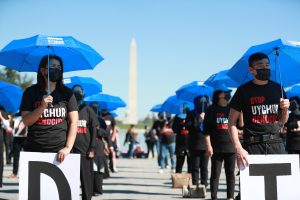On June 17, 2020, at the stroke of a pen, the Uyghur Human Rights Policy (UHRP) Act became law in the United States. It was the first piece of legislation focused on the rights of the Uyghur people anywhere in the world. Coming at a time of mounting reports of mass internment, the UHRP Act was a beacon of hope, and welcomed by Uyghurs worldwide.
As a Uyghur activist who has spent my entire life working for the dignity of my people, it was a time for hope. We had overwhelming bipartisan support from the entire U.S. Congress to begin imposing costs on Chinese government officials perpetrating atrocities.
Three years on, the UHRP Act has seen only token implementation. Tokenism isn’t enough to fight a genocide.
The Uyghurs and other Turkic peoples in East Turkestan are experiencing ongoing crimes against humanity and genocide at the hands of the Chinese government. As former editor Ambassador Beth Van Schaack wrote for Just Security in 2021, “it is not necessary to wait for a group to be destroyed in whole or in part” before invoking the Genocide Convention. The key, she continued, is finding ways to actuate “the preventative potential of the Genocide Convention — the promise made by Raphael Lemkin of ‘no more extermination, no more mass killings, no more concentration camps, no more sterilizations, no more breaking up of families.’”
The scale of the abuses against Uyghurs and other Turkic peoples is staggering, with an estimated two to three million people detained without charge or trial in a giant mass internment program. Then there are the forced sterilizations, forced labor, and other atrocity crimes. A UHRP report by Dr. Henryk Szadzieski on long prison sentences for professors, poets, and other intellectuals contends that this amounts to a deliberate eliticide. The abuses have been condemned by numerous international organizations, including the United Nations, the European Union, the United States, and other governments.
The legal obligation placed on the U.S. government through the UHRP Act is simple and straightforward. The act requires the secretary of state to make a list of the perpetrators of mass atrocities and to impose targeted human rights sanctions on each of these officials and entities, under the Global Magnitsky Human Rights Accountability Act. Magnitsky sanctions originated as part of President Barack Obama’s atrocities prevention and response initiative — a critical tool for accountability that he signed into law in 2016.
In 2020, the Trump administration imposed eight Magnitsky sanctions on perpetrators of atrocities against Uyghurs. The Biden administration has managed just four. Can any reasonable person believe that only 12 officials and government entities are responsible for this genocide?
The Uyghur Forced Labor Prevention Act (UFLPA), enacted in December 2021, amended the UHRP Act to mandate Global Magnitsky sanctions on all perpetrators of forced labor against Uyghurs. This means PRC officials, PRC government agencies, and, not least, PRC companies. Given the scale of the ongoing genocide and China’s official policy to require universal forced labor of Uyghurs, why have there been no further sanctions since December 2021?
The rest of the act required four very basic reports. None have been made public to date. It has been left to the Congress and private researchers to document the litany of atrocity crimes. The State Department is required to draft a public report on human rights violations in East Turkestan and the U.S. government’s diplomatic responses to the matter. We haven’t seen it. The director of national intelligence was required to submit two reports on the security and economic threats posed by the Chinese government’s crackdown on Uyghurs, actions by other governments to forcibly return Uyghur refugees and asylum seekers to China, and the creation or transfer of technology that promotes mass internment and surveillance. We haven’t seen these reports either.
That’s why I have been encouraged to see new legislation introduced by Rep. Ritchie Torres (D-New York) to require an annual intelligence report on the genocide. It’s been officially adopted as a legislative priority by the bipartisan House Select Committee on the Chinese Communist Party.
Under the UHRP Act, the FBI is also required to report to Congress regarding their efforts to safeguard Uyghurs and Chinese nationals from the Chinese government’s harassment and transnational intimidation within the United States. In 2019, I wrote about China’s cross-border campaign to terrorize Uyghur Americans, highlighting a UHRP report analyzing how Chinese government agents violate the rights of Uyghur Americans on U.S. soil. Two years later, in 2021, an FBI bulletin confirmed our analysis in the title itself: “Chinese Government Transnational Repression Violates US Laws and US-based Uyghurs’ Rights.” In 2022, the FBI finally created a specific guide on transnational repression as a distinct form of criminal behavior, and asked the public to report incidents to law-enforcement.
Ultimately, the wide-ranging imposition of Global Magnitsky sanctions on Chinese officials involved in the genocide of Uyghurs is critical, because it sends a strong message that the international community will not tolerate atrocities committed by the Chinese government. Sanctions serve as a deterrent and demonstrate the United States is willing to take targeted action against those responsible for crimes against humanity. Ensuring justice for Uyghurs will reinvigorate hope that the U.S. has not given up in the face of genocide — not only for Uyghurs but for all those suffering deliberate state atrocity crimes around the world.

































